# 개념
Airflow를 통해 DAG을 작성하다보면, 일반적으로 PythonOperator 를 많이 사용하게 됩니다.
Taskflow API는 이런 PythonOperator 을 좀 더 쉽게 사용하기 위해 2.x 버전부터 등장한 개념입니다.
Taskflow API를 사용하면 DAG을 작성하는 방식이 기존과 조금 달라지게 됩니다.
# Graph View
다음과 같은 Task 의존성을 가지는 DAG을 Taskflow API로 작성해보겠습니다.
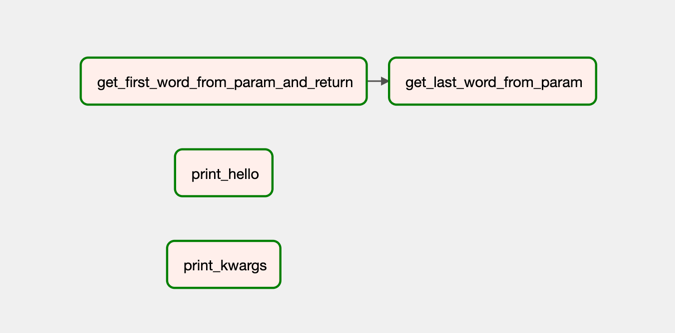
# Code
전체 코드는 다음과 같습니다.
from datetime import datetime
from airflow.decorators import dag, task
from pendulum.tz.timezone import Timezone
@dag(
dag_id="01_concept",
description="Taskflow API를 사용하는 간단한 DAG 예제입니다.",
default_args={
"owner": "heumsi",
"retries": 0,
},
start_date=datetime(2022, 1, 20, tzinfo=Timezone("Asia/Seoul")),
schedule_interval="@once",
tags=["examples", "06_taskflow_api"],
)
def main():
"""Taskflow API를 사용하는 간단한 DAG 예제입니다.
1. print_hello()와 get_first_word_from_param_and_return() 를 실행합니다.
2. get_first_word_from_param_and_return() 이 성공하면 get_last_word_from_param()를 실행합니다.
"""
@task
def print_hello() -> None:
"""hello를 출력합니다."""
print("hello")
@task
def get_first_word_from_param_and_return(param: str) -> str:
"""문자열 param의 첫 번째 단어를 출력하고, param을 반환합니다."""
first_word = param.split()[0]
print(first_word) # welcome
return param
@task
def get_last_word_from_param(param: str) -> None:
"""문자열 param의 마지막 단어를 출력합니다."""
last_word = param.split()[-1]
print(last_word) # tutorials
@task
def print_kwargs(**kwargs) -> None:
print(kwargs)
print_hello()
ret = get_first_word_from_param_and_return("welcome to airflow tutorials")
get_last_word_from_param(ret)
print_kwargs()
dag = main()
1
2
3
4
5
6
7
8
9
10
11
12
13
14
15
16
17
18
19
20
21
22
23
24
25
26
27
28
29
30
31
32
33
34
35
36
37
38
39
40
41
42
43
44
45
46
47
48
49
50
51
52
53
54
55
56
2
3
4
5
6
7
8
9
10
11
12
13
14
15
16
17
18
19
20
21
22
23
24
25
26
27
28
29
30
31
32
33
34
35
36
37
38
39
40
41
42
43
44
45
46
47
48
49
50
51
52
53
54
55
56
주요한 부분을 하나씩 살펴보겠습니다.
from datetime import datetime
from airflow.decorators import dag, task
from pendulum.tz.timezone import Timezone
@dag(
dag_id="01_concept",
description="Taskflow API를 사용하는 간단한 DAG 예제입니다.",
default_args={
"owner": "heumsi",
"retries": 0,
},
start_date=datetime(2022, 1, 20, tzinfo=Timezone("Asia/Seoul")),
schedule_interval="@once",
tags=["examples", "06_taskflow_api"],
)
def main():
"""Taskflow API를 사용하는 간단한 DAG 예제입니다.
1. print_hello()와 get_first_word_from_param_and_return() 를 실행합니다.
2. get_first_word_from_param_and_return() 이 성공하면 get_last_word_from_param()를 실행합니다.
"""
@task
def print_hello() -> None:
"""hello를 출력합니다."""
print("hello")
@task
def get_first_word_from_param_and_return(param: str) -> str:
"""문자열 param의 첫 번째 단어를 출력하고, param을 반환합니다."""
first_word = param.split()[0]
print(first_word) # welcome
return param
@task
def get_last_word_from_param(param: str) -> None:
"""문자열 param의 마지막 단어를 출력합니다."""
last_word = param.split()[-1]
print(last_word) # tutorials
@task
def print_kwargs(**kwargs) -> None:
print(kwargs)
print_hello()
ret = get_first_word_from_param_and_return("welcome to airflow tutorials")
get_last_word_from_param(ret)
print_kwargs()
dag = main()
1
2
3
4
5
6
7
8
9
10
11
12
13
14
15
16
17
18
19
20
21
22
23
24
25
26
27
28
29
30
31
32
33
34
35
36
37
38
39
40
41
42
43
44
45
46
47
48
49
50
51
52
53
54
55
56
2
3
4
5
6
7
8
9
10
11
12
13
14
15
16
17
18
19
20
21
22
23
24
25
26
27
28
29
30
31
32
33
34
35
36
37
38
39
40
41
42
43
44
45
46
47
48
49
50
51
52
53
54
55
56
@dag데코레이터를 메인이 되는 함수 위에 두어DAG인스턴스를 정의합니다.@dag데코레이터 내 파라미터는 일반적인DAG생성 파라미터와 동일합니다.
from datetime import datetime
from airflow.decorators import dag, task
from pendulum.tz.timezone import Timezone
@dag(
dag_id="01_concept",
description="Taskflow API를 사용하는 간단한 DAG 예제입니다.",
default_args={
"owner": "heumsi",
"retries": 0,
},
start_date=datetime(2022, 1, 20, tzinfo=Timezone("Asia/Seoul")),
schedule_interval="@once",
tags=["examples", "06_taskflow_api"],
)
def main():
"""Taskflow API를 사용하는 간단한 DAG 예제입니다.
1. print_hello()와 get_first_word_from_param_and_return() 를 실행합니다.
2. get_first_word_from_param_and_return() 이 성공하면 get_last_word_from_param()를 실행합니다.
"""
@task
def print_hello() -> None:
"""hello를 출력합니다."""
print("hello")
@task
def get_first_word_from_param_and_return(param: str) -> str:
"""문자열 param의 첫 번째 단어를 출력하고, param을 반환합니다."""
first_word = param.split()[0]
print(first_word) # welcome
return param
@task
def get_last_word_from_param(param: str) -> None:
"""문자열 param의 마지막 단어를 출력합니다."""
last_word = param.split()[-1]
print(last_word) # tutorials
@task
def print_kwargs(**kwargs) -> None:
print(kwargs)
print_hello()
ret = get_first_word_from_param_and_return("welcome to airflow tutorials")
get_last_word_from_param(ret)
print_kwargs()
dag = main()
1
2
3
4
5
6
7
8
9
10
11
12
13
14
15
16
17
18
19
20
21
22
23
24
25
26
27
28
29
30
31
32
33
34
35
36
37
38
39
40
41
42
43
44
45
46
47
48
49
50
51
52
53
54
55
56
2
3
4
5
6
7
8
9
10
11
12
13
14
15
16
17
18
19
20
21
22
23
24
25
26
27
28
29
30
31
32
33
34
35
36
37
38
39
40
41
42
43
44
45
46
47
48
49
50
51
52
53
54
55
56
@task데코레이터를 함수 위에 두어 Task 인스턴스를 정의합니다.- 기존과 달리
PythonOperator로 정의하지 않고 함수를 정의한 뒤 데코레이터를 붙이는 방식입니다.
- 기존과 달리
from datetime import datetime
from airflow.decorators import dag, task
from pendulum.tz.timezone import Timezone
@dag(
dag_id="01_concept",
description="Taskflow API를 사용하는 간단한 DAG 예제입니다.",
default_args={
"owner": "heumsi",
"retries": 0,
},
start_date=datetime(2022, 1, 20, tzinfo=Timezone("Asia/Seoul")),
schedule_interval="@once",
tags=["examples", "06_taskflow_api"],
)
def main():
"""Taskflow API를 사용하는 간단한 DAG 예제입니다.
1. print_hello()와 get_first_word_from_param_and_return() 를 실행합니다.
2. get_first_word_from_param_and_return() 이 성공하면 get_last_word_from_param()를 실행합니다.
"""
@task
def print_hello() -> None:
"""hello를 출력합니다."""
print("hello")
@task
def get_first_word_from_param_and_return(param: str) -> str:
"""문자열 param의 첫 번째 단어를 출력하고, param을 반환합니다."""
first_word = param.split()[0]
print(first_word) # welcome
return param
@task
def get_last_word_from_param(param: str) -> None:
"""문자열 param의 마지막 단어를 출력합니다."""
last_word = param.split()[-1]
print(last_word) # tutorials
@task
def print_kwargs(**kwargs) -> None:
print(kwargs)
print_hello()
ret = get_first_word_from_param_and_return("welcome to airflow tutorials")
get_last_word_from_param(ret)
print_kwargs()
dag = main()
1
2
3
4
5
6
7
8
9
10
11
12
13
14
15
16
17
18
19
20
21
22
23
24
25
26
27
28
29
30
31
32
33
34
35
36
37
38
39
40
41
42
43
44
45
46
47
48
49
50
51
52
53
54
55
56
2
3
4
5
6
7
8
9
10
11
12
13
14
15
16
17
18
19
20
21
22
23
24
25
26
27
28
29
30
31
32
33
34
35
36
37
38
39
40
41
42
43
44
45
46
47
48
49
50
51
52
53
54
55
56
@task데코레이터를 붙인 함수(Task Instance)들을 호출합니다.- 함수 간 의존 관계가 있다면 Scheduler가 파싱할 때 자동으로 의존 관계가 설정됩니다.
- 즉
>>와 같이 명시적으로 Task Instance간 의존성 정의를 하지 않아도 됩니다.
- 즉
Taskflow API 형태가 아닌 Operator 형태로 작성했다면 다음과 같습니다.
from datetime import datetime
from airflow import DAG
from airflow.operators.python import PythonOperator
from pendulum.tz.timezone import Timezone
with DAG(
dag_id="01_concept_pyoperator_version",
description="Taskflow API를 사용한 '01_concept' DAG을 PythonOperator로 다시 작성한 DAG 예제입니다.",
default_args={
"owner": "heumsi",
"retries": 0,
},
start_date=datetime(2022, 1, 20, tzinfo=Timezone("Asia/Seoul")),
schedule_interval="@once",
tags=["examples", "06_taskflow_api"],
doc_md="""
Taskflow API를 사용하는 간단한 DAG 예제입니다.
1. print_hello()와 get_first_word_from_param_and_return() 를 실행합니다.
2. get_first_word_from_param_and_return() 이 성공하면 get_last_word_from_param()를 실행합니다.
""",
) as dag:
def print_hello() -> None:
"""hello를 출력합니다."""
print("hello")
def get_first_word_from_param_and_return(param: str) -> str:
"""문자열 param의 첫 번째 단어를 출력하고, param을 반환합니다."""
first_word = param.split()[0]
print(first_word)
return param
def get_last_word_from_param(param: str) -> None:
"""문자열 param의 마지막 단어를 출력합니다."""
last_word = param.split()[-1]
print(last_word)
def print_kwargs(**kwargs) -> None:
print(kwargs)
task_1 = PythonOperator(task_id="print_hello", python_callable=print_hello)
task_2 = PythonOperator(
task_id="get_first_word_from_param_and_return",
python_callable=get_first_word_from_param_and_return,
op_args=[
"welcome to airflow tutorials",
],
)
task_3 = PythonOperator(
task_id="get_last_word_from_param",
python_callable=get_last_word_from_param,
op_args=[
"{{ task_instance.xcom_pull(task_ids='get_first_word_from_param_and_return') }}"
],
)
task_4 = PythonOperator(task_id="print_kwargs", python_callable=print_kwargs)
task_2 >> task_3
1
2
3
4
5
6
7
8
9
10
11
12
13
14
15
16
17
18
19
20
21
22
23
24
25
26
27
28
29
30
31
32
33
34
35
36
37
38
39
40
41
42
43
44
45
46
47
48
49
50
51
52
53
54
55
56
57
58
59
60
61
62
63
64
65
66
2
3
4
5
6
7
8
9
10
11
12
13
14
15
16
17
18
19
20
21
22
23
24
25
26
27
28
29
30
31
32
33
34
35
36
37
38
39
40
41
42
43
44
45
46
47
48
49
50
51
52
53
54
55
56
57
58
59
60
61
62
63
64
65
66
- Taskflow API에 비해 코드량이 조금 더 늘어납니다.
- 또한 XCom을 직접 사용해야해서 조금 복잡할 수 있습니다.
# Web UI & Logs
DAG을 실행하면 다음과 같은 화면을 얻습니다.
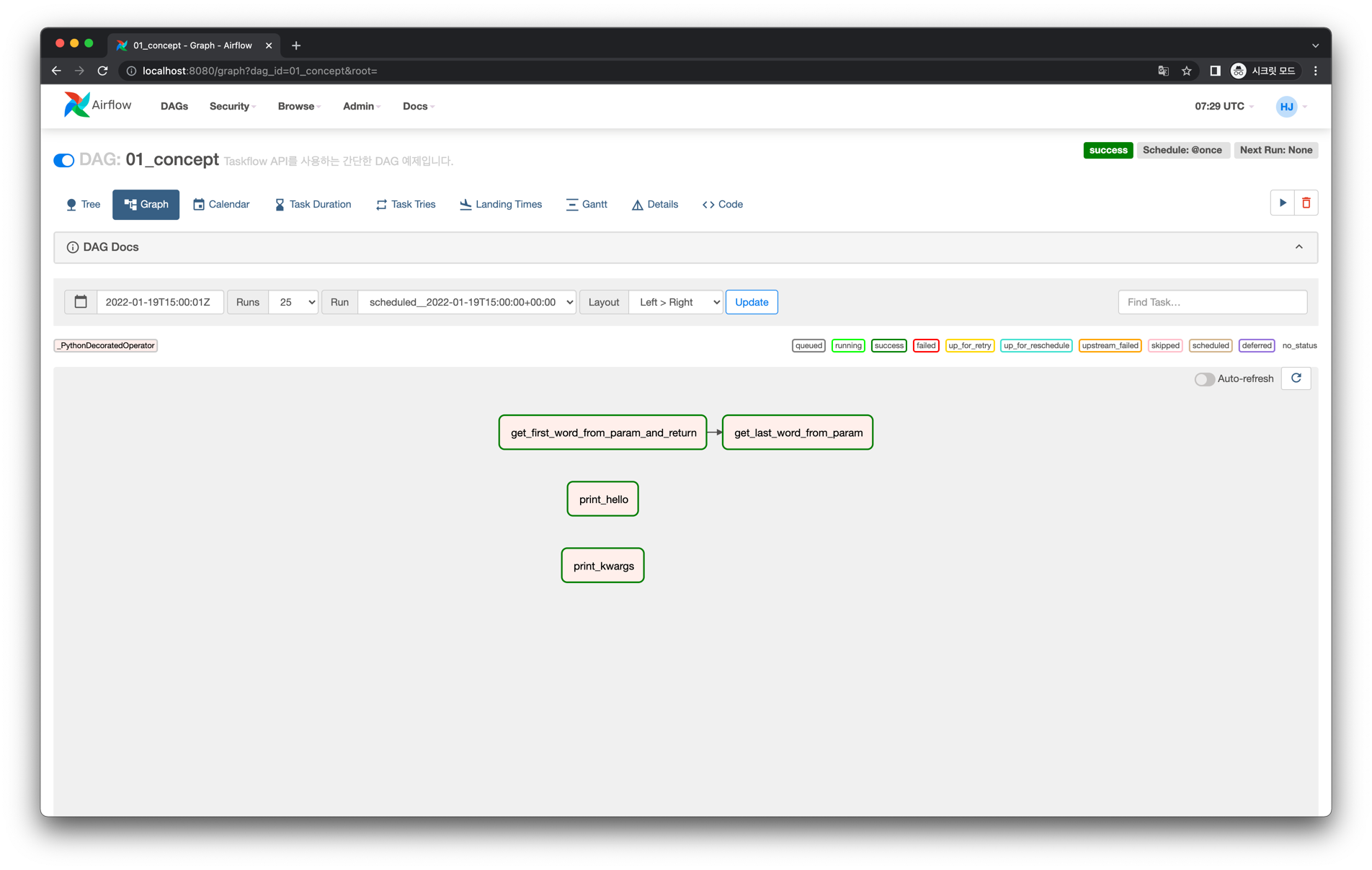
각 Task Instance의 로그를 살펴보면 다음과 같습니다.
# print_hello
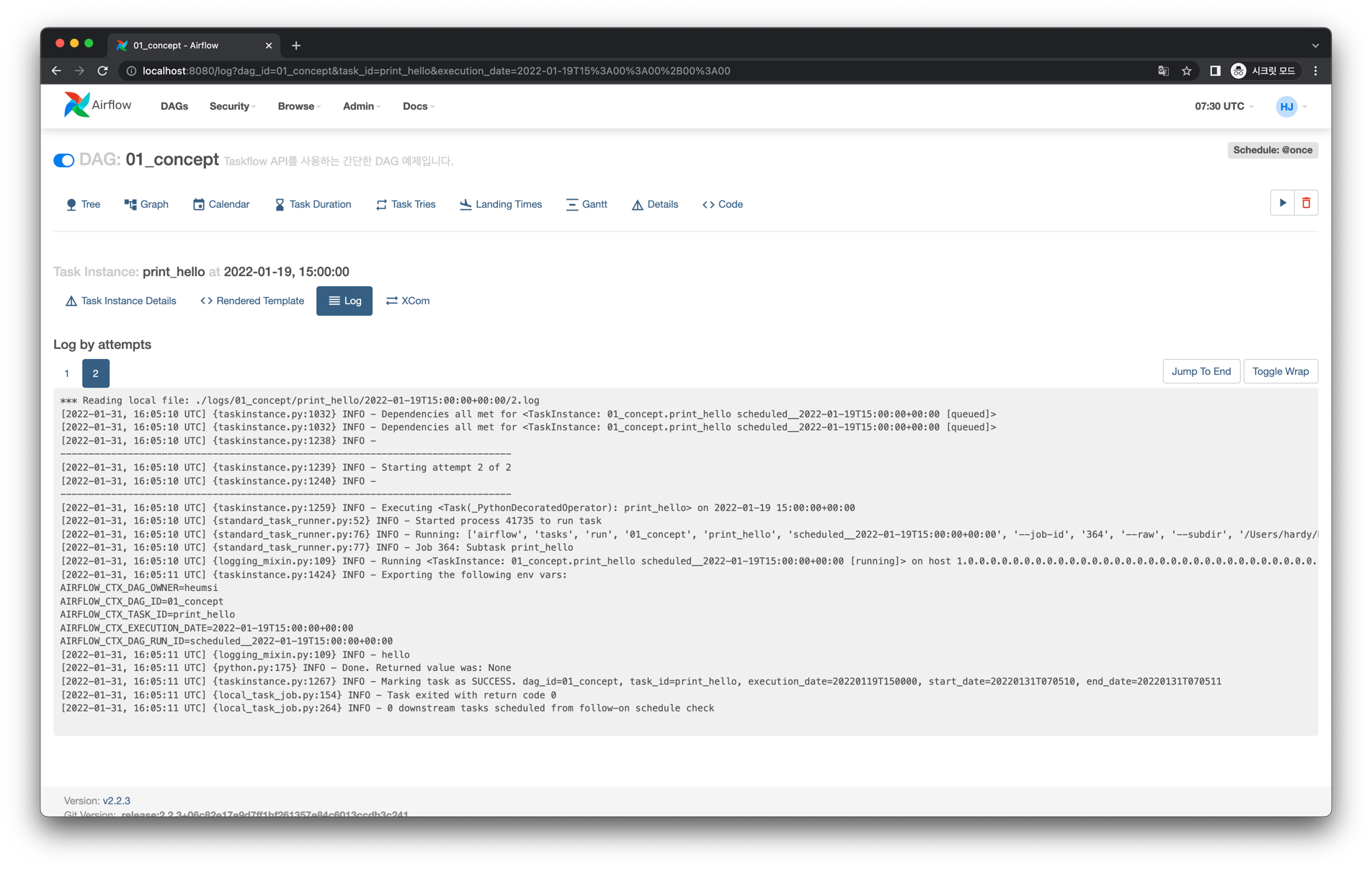
[2022-01-31, 16:05:11 UTC] {logging_mixin.py:109} INFO - hello
1
# get_first_word_from_param_and_return
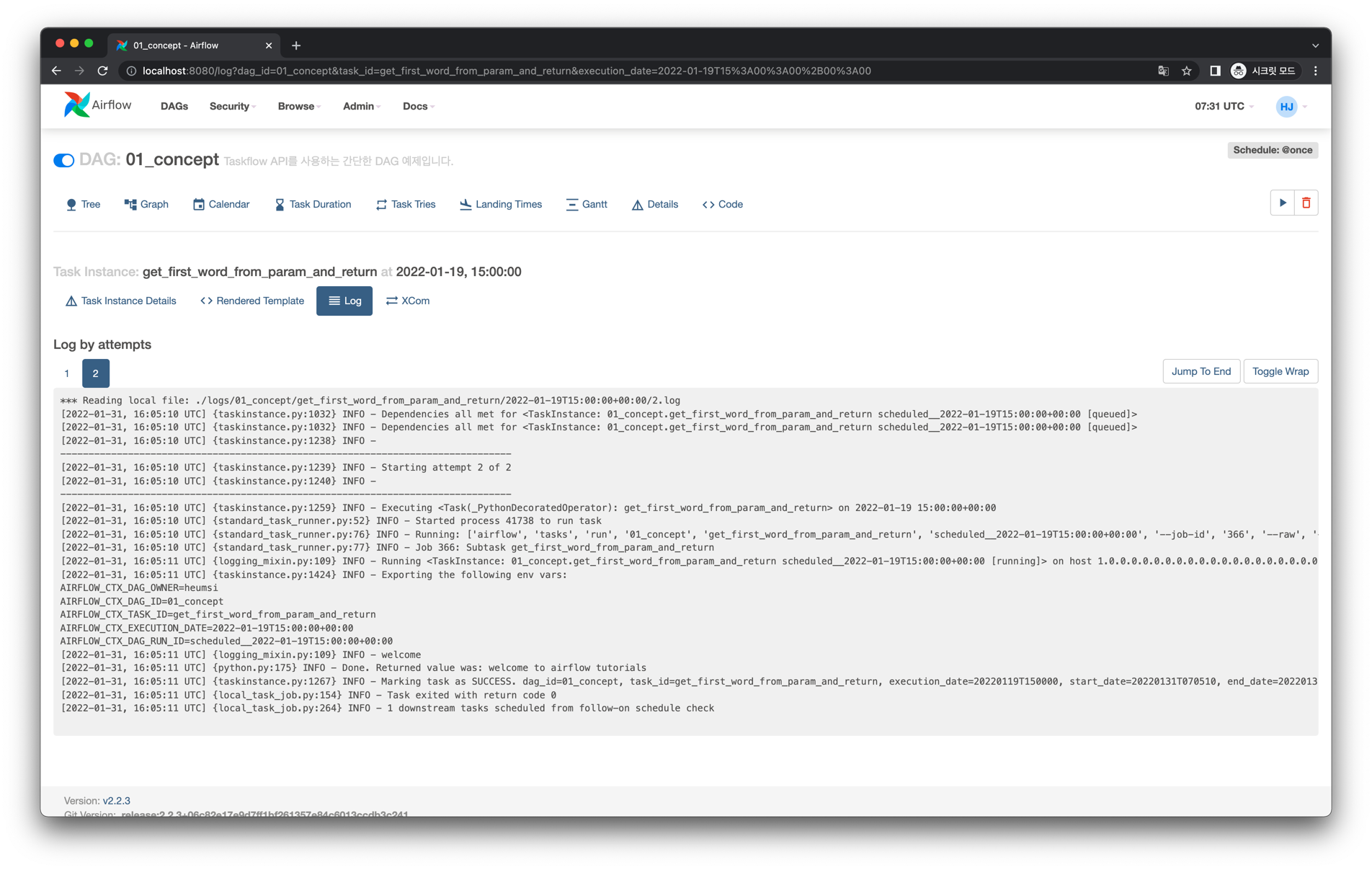
[2022-01-31, 16:05:11 UTC] {logging_mixin.py:109} INFO - welcome
1
# get_last_word_from_param
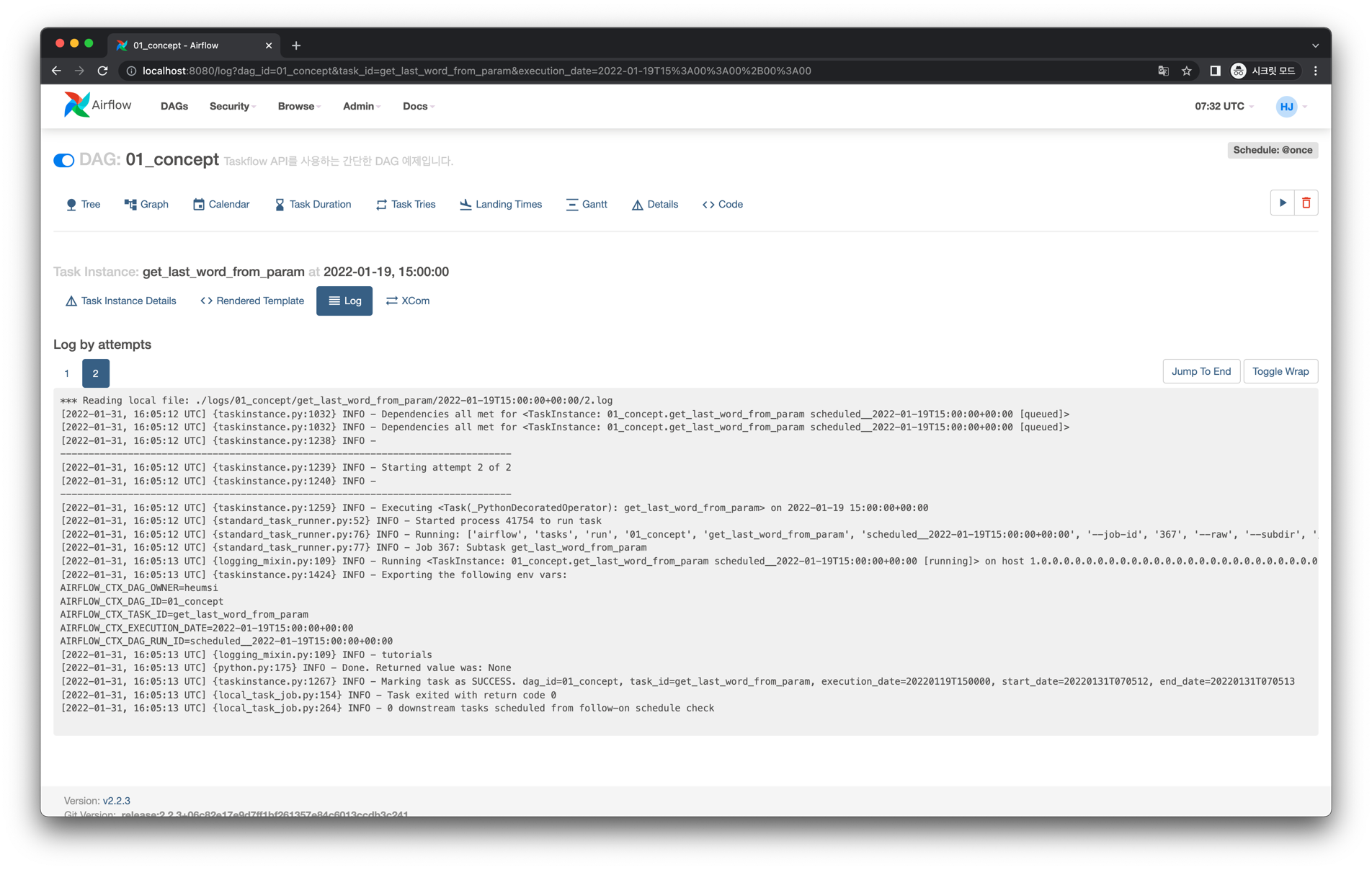
[2022-01-31, 16:05:13 UTC] {logging_mixin.py:109} INFO - tutorials
1
# print_kwargs
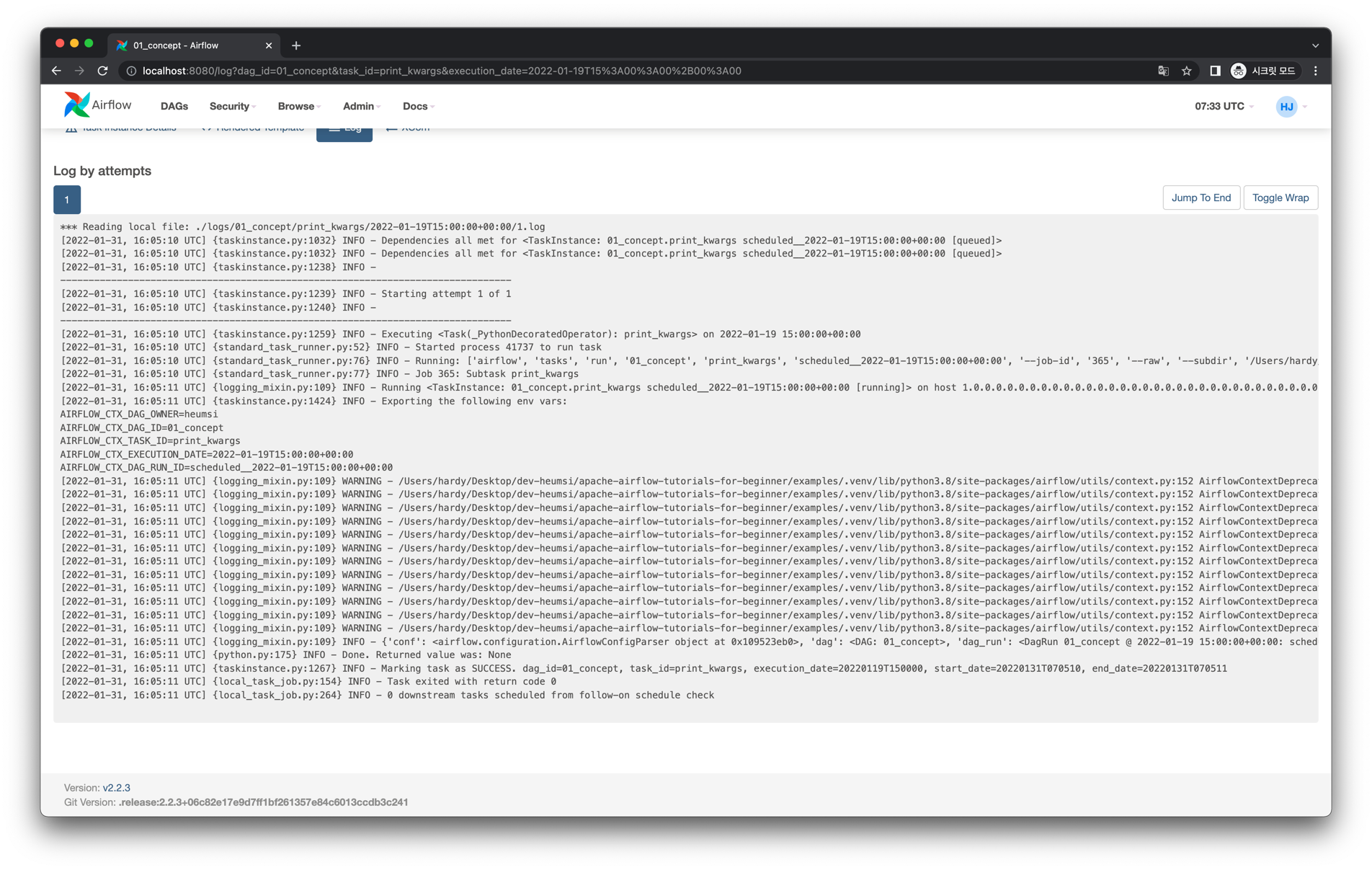
[2022-01-31, 16:05:11 UTC] {logging_mixin.py:109} INFO - {
'conf': <airflow.configuration.AirflowConfigParser object at 0x109523eb0>,
'dag': <DAG: 01_concept>,
'dag_run': <DagRun 01_concept @ 2022-01-19 15:00:00+00:00: scheduled__2022-01-19T15:00:00+00:00, externally triggered: False>,
'data_interval_end': DateTime(2022, 1, 19, 15, 0, 0, tzinfo=Timezone('UTC')),
'data_interval_start': DateTime(2022, 1, 19, 15, 0, 0, tzinfo=Timezone('UTC')),
'ds': '2022-01-19',
'ds_nodash': '20220119',
'execution_date': DateTime(2022, 1, 19, 15, 0, 0, tzinfo=Timezone('UTC')),
'inlets': [],
'logical_date': DateTime(2022, 1, 19, 15, 0, 0, tzinfo=Timezone('UTC')),
'macros': <module 'airflow.macros' from '/Users/hardy/Desktop/dev-heumsi/apache-airflow-tutorials-for-beginner/examples/.venv/lib/python3.8/site-packages/airflow/macros/__init__.py'>,
'next_ds': None,
'next_ds_nodash': None,
'next_execution_date': None,
'outlets': [],
'params': {},
'prev_data_interval_start_success': None,
'prev_data_interval_end_success': None,
'prev_ds': None,
'prev_ds_nodash': None,
'prev_execution_date': None,
'prev_execution_date_success': None,
'prev_start_date_success': None,
'run_id': 'scheduled__2022-01-19T15:00:00+00:00',
'task': <Task(_PythonDecoratedOperator): print_kwargs>,
'task_instance': <TaskInstance: 01_concept.print_kwargs scheduled__2022-01-19T15:00:00+00:00 [running]>,
'task_instance_key_str': '01_concept__print_kwargs__20220119',
'test_mode': False,
'ti': <TaskInstance: 01_concept.print_kwargs scheduled__2022-01-19T15:00:00+00:00 [running]>,
'tomorrow_ds': '2022-01-20',
'tomorrow_ds_nodash': '20220120',
'ts': '2022-01-19T15:00:00+00:00',
'ts_nodash': '20220119T150000',
'ts_nodash_with_tz': '20220119T150000+0000',
'var': {'json': None, 'value': None},
'conn': None,
'yesterday_ds': '2022-01-18',
'yesterday_ds_nodash': '20220118',
'templates_dict': None
}
1
2
3
4
5
6
7
8
9
10
11
12
13
14
15
16
17
18
19
20
21
22
23
24
25
26
27
28
29
30
31
32
33
34
35
36
37
38
39
40
41
2
3
4
5
6
7
8
9
10
11
12
13
14
15
16
17
18
19
20
21
22
23
24
25
26
27
28
29
30
31
32
33
34
35
36
37
38
39
40
41
